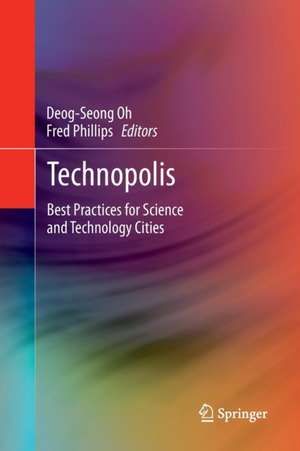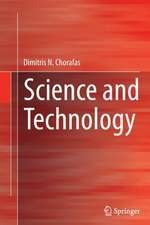Technopolis: Best Practices for Science and Technology Cities
Editat de Deog-Seong Oh, Fred Phillipsen Limba Engleză Paperback – 27 aug 2016
| Toate formatele și edițiile | Preț | Express |
|---|---|---|
| Paperback (1) | 955.08 lei 6-8 săpt. | |
| SPRINGER LONDON – 27 aug 2016 | 955.08 lei 6-8 săpt. | |
| Hardback (1) | 961.41 lei 6-8 săpt. | |
| SPRINGER LONDON – 7 ian 2014 | 961.41 lei 6-8 săpt. |
Preț: 955.08 lei
Preț vechi: 1164.73 lei
-18% Nou
Puncte Express: 1433
Preț estimativ în valută:
182.78€ • 190.12$ • 150.89£
182.78€ • 190.12$ • 150.89£
Carte tipărită la comandă
Livrare economică 14-28 aprilie
Preluare comenzi: 021 569.72.76
Specificații
ISBN-13: 9781447169581
ISBN-10: 1447169581
Pagini: 506
Ilustrații: XIV, 506 p. 141 illus., 70 illus. in color.
Dimensiuni: 155 x 235 x 27 mm
Greutate: 0.72 kg
Ediția:Softcover reprint of the original 1st ed. 2014
Editura: SPRINGER LONDON
Colecția Springer
Locul publicării:London, United Kingdom
ISBN-10: 1447169581
Pagini: 506
Ilustrații: XIV, 506 p. 141 illus., 70 illus. in color.
Dimensiuni: 155 x 235 x 27 mm
Greutate: 0.72 kg
Ediția:Softcover reprint of the original 1st ed. 2014
Editura: SPRINGER LONDON
Colecția Springer
Locul publicării:London, United Kingdom
Cuprins
A New Strategic Approach to Science Cities: Towards the Achievement of Sustainable and Balanced Spatial Development.- Regional innovation and cooperation among industries, universities, R&D institutes and governments.- Regional Innovation Support Systems and Science Cities.- The Triple Helix: International Cases and Critical Summary.- Sustainable Development of Technopolis.- Support mechanism in Technopolis towards Green Growth.- Arrangement of Actors in the Triple Helix Innovation.- Business Incubation Strategy of High-tech Venture Firms in Science Park. Regional innovation and cooperation among industries, universities, R&D institutes and governments.- Regional Innovation Support Systems and Science Cities.- The Triple Helix: International Cases and Critical Summary.- Sustainable Development of Technopolis.- Support mechanism in Technopolis towards Green Growth.- Arrangement of Actors in the Triple Helix Innovation.- Business Incubation Strategy of High-tech Venture Firms in Science Park. The Triple Helix: International Cases and Critical Summary.- Sustainable Development of Technopolis.- Support mechanism in Technopolis towards Green Growth.- Arrangement of Actors in the Triple Helix Innovation.- Business Incubation Strategy of High-tech Venture Firms in Science Park. Sustainable Development of Technopolis.- Support mechanism in Technopolis towards Green Growth.- Arrangement of Actors in the Triple Helix Innovation.- Business Incubation Strategy of High-tech Venture Firms in Science Park. Regional innovation and cooperation among industries, universities, R&D institutes and governments.- Regional Innovation Support Systems and Science Cities.- The Triple Helix: International Cases and Critical Summary.- Sustainable Development of Technopolis.- Support mechanism in Technopolis towards Green Growth.- Arrangement of Actors in the Triple Helix Innovation.- Business Incubation Strategy of High-tech Venture Firms in Science Park. The Triple Helix:International Cases and Critical Summary.- Sustainable Development of Technopolis.- Support mechanism in Technopolis towards Green Growth.- Arrangement of Actors in the Triple Helix Innovation.- Business Incubation Strategy of High-tech Venture Firms in Science Park. Sustainable Development of Technopolis.- Support mechanism in Technopolis towards Green Growth.- Arrangement of Actors in the Triple Helix Innovation.- Business Incubation Strategy of High-tech Venture Firms in Science Park. The Triple Helix: International Cases and Critical Summary.- Sustainable Development of Technopolis.- Support mechanism in Technopolis towards Green Growth.- Arrangement of Actors in the Triple Helix Innovation.- Business Incubation Strategy of High-tech Venture Firms in Science Park. Sustainable Development of Technopolis.- Support mechanism in Technopolis towards Green Growth.- Arrangement of Actors in the Triple Helix Innovation.- Business Incubation Strategy of High-tech Venture Firms in Science Park. Sustainable Development of Technopolis.- Support mechanism in Technopolis towards Green Growth.- Arrangement of Actors in the Triple Helix Innovation.- Business Incubation Strategy of High-tech Venture Firms in Science Park.
Recenzii
“Technopolis - Best Practices for Science and Technology in Cities is a comprehensive study and summary for understanding how science parks and technology clusters are developed. … this book includes valuable information, experience and knowledge that will likely be very helpful to readers involved in these kinds of efforts. The book is well documented with graphics to explain and accompany the text. University researchers, incubator and commercialization professionals would benefit from reading this book. Highly recommended.” (Jeff Thurston, 3dvisworld.com, April, 2015)
Notă biografică
Prof. Doeg-Seong Oh is currently a professor of College of Engineering at Chungnam National University, Daejeon, Republic of Korea and Secretary General of World Technopolis Association (WTA), which consists of 77 member cities in 39 countries (October 2010). He has involved in WTA as a Chairman of the Academic Committee since 1997 and has been acting the role of General Secretary Since 2004. In 2009, as a world leader of the scientific organization, he was registered at the Marquis Who's Who LLC, “2000 Outstanding Intellectuals of 21st Century" by the IBC (International Biographical Centre, Cambridge, England) and 'Great Minds of the 21st Century' by American Biographical Institute (ABI).
He received a Master of Urban Planning in 1979 and a Master of Science in Architecture from Seoul National University, Korea in 1981. He got a PhD degree in Urban Planning from Hanover University, Germany in 1989. He did his post-doctoral research at University of Sheffield, UK in 1993. He joined the faculty of spatial planning at University of Dortmund as a visiting professor in 2002-2004. He also acted the executive director of Regional Development Research Institute (RDRI) for 7 years from 1995, which did important role for regional innovation in Daejeon City and Chungnam province.
Fred Phillips is author of Market-Oriented Technology Management: Innovating for Profit in Entrepreneurial Times (Springer, 2001), and Editor-in-Chief of the international journal Technological Forecasting & Social Change. He lived in Austin for twenty-six years and in Portland for nine years, playing leading roles in the development of both technopoleis. He has consulted worldwide on the technopolis formation process and on new business incubation, most recently for the US Environmental Protection Agency for the launch of a water technology cluster in the southern Ohio – northern Kentucky – southeast Indiana region. He is a Senior Fellow of the IC2 Institute atUniversity of Texas at Austin, a think-tank which originated the academic study of the technopolis phenomenon.
He received a Master of Urban Planning in 1979 and a Master of Science in Architecture from Seoul National University, Korea in 1981. He got a PhD degree in Urban Planning from Hanover University, Germany in 1989. He did his post-doctoral research at University of Sheffield, UK in 1993. He joined the faculty of spatial planning at University of Dortmund as a visiting professor in 2002-2004. He also acted the executive director of Regional Development Research Institute (RDRI) for 7 years from 1995, which did important role for regional innovation in Daejeon City and Chungnam province.
Fred Phillips is author of Market-Oriented Technology Management: Innovating for Profit in Entrepreneurial Times (Springer, 2001), and Editor-in-Chief of the international journal Technological Forecasting & Social Change. He lived in Austin for twenty-six years and in Portland for nine years, playing leading roles in the development of both technopoleis. He has consulted worldwide on the technopolis formation process and on new business incubation, most recently for the US Environmental Protection Agency for the launch of a water technology cluster in the southern Ohio – northern Kentucky – southeast Indiana region. He is a Senior Fellow of the IC2 Institute atUniversity of Texas at Austin, a think-tank which originated the academic study of the technopolis phenomenon.
Textul de pe ultima copertă
Six years of UNESCO-World Technopolis Association workshops, held at various world cities and attended by government officials and scholars from nearly all the world’s countries, have resulted in a uniquely complete collection of reports on science park and science city projects in most of those countries. These reports, of which a selected few form chapters in this book, allow readers to compare knowledge-based development strategies, practices, and successes across countries. The chapters illustrate varying levels of cooperation across government, industry, and academic sectors in the respective projects – and the reasons and philosophies underlying this variation - and resulting differences in practices and results
Caracteristici
Allows readers to compare knowledge-based development strategies, practices, and successes across countries Illustrates varying levels of cooperation across government, industry and the reasons and philosophies underlying this variation to consider resulting differences in practices and outcomes Includes supplementary material: sn.pub/extras


















